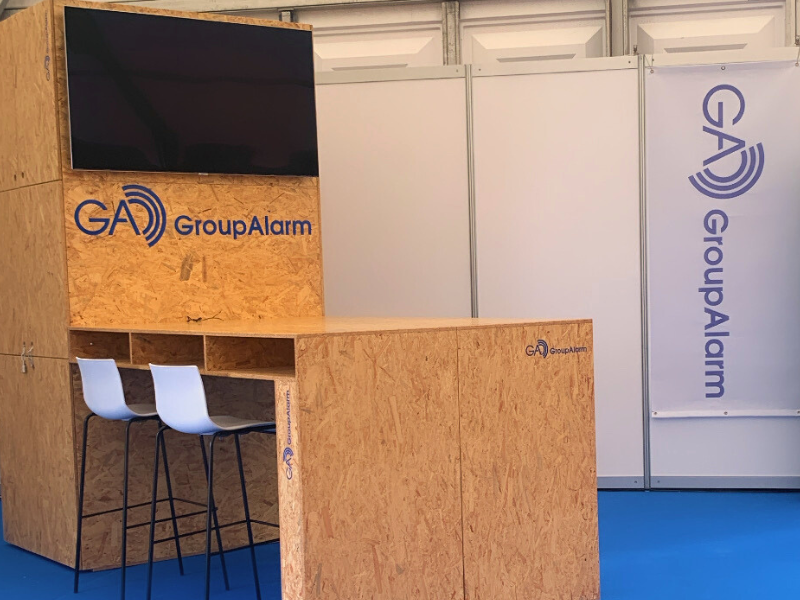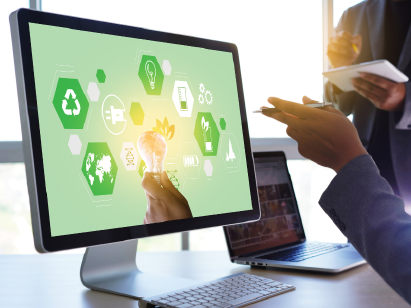Table of contents
The topic of sustainability is on everyone’s lips and is becoming a key component for companies worldwide at a time when environmental problems are increasingly demanding our attention. For us, however, sustainability is not only a business necessity to act in an ecologically and socially responsible way, but also a matter of conscience. In this blog post, you can read about the specific reasons that have led us to make our company more sustainable and what we in the GroupAlarm team are doing to achieve this.
Why we needed to become more sustainable
In general, the software industry is known for its fast innovation cycle and the rapid development of new technologies. This progress in particular is often accompanied by a high consumption of resources and energy. In our specific segment, this is not quite as extreme, but we too have recognised that as a technology company, we have our own responsibility for what happens to the resources we have. In order to improve our ecological footprint, we therefore started to rethink our processes and ways of working several years ago and implemented more environmentally friendly practices.
How we create sustainability
An important step was to optimise the energy consumption of the software and infrastructure by using energy-efficient hardware and more efficient algorithms. In addition, the implementation of agile development methods reduced the time needed for projects and thus also reduced energy consumption. Last but not least, sustainability is not only a matter of environmental protection, but also offers added economic value and makes our company more attractive for employees, customers and partners. With the conscious decision to become more sustainable, we as software developers want to set an example for shaping a more environmentally friendly future. Other measures we have introduced to achieve this include the digitalisation of documents and advertising flyers, the realisation of environmentally friendly trade fair stands, the promotion of e-bikes and mobile working, the provision of job tickets and green hosting. And here come the details:
Digitisation of documents
Fact: The traditional use of paper in companies contributes to deforestation and environmental pollution. As a company, we already took the first step towards sustainability a few years ago by voluntarily dispensing of printed customer invoices. The second, big step was the conversion of our advertising flyers to the digital PDF format, which has proven to be successful both in terms of customer acceptance and from the sustainability aspect within a very short time. Overall, by digitising documents, promoting a paperless office environment and converting our flyers from paper to PDF, we have been able to significantly reduce paper consumption as well as prevent unnecessary paper waste. Furthermore, this step not only saves natural resources, but also the costs of printing and archiving documents.

“Zero Waste” exhibition stand
According to a definition on Wikipedia, zero waste is “a philosophy that strives for sustainability. It pursues the goal of leading a life in which as little waste as possible is produced, and raw materials are not wasted.” We can endorse this guiding principle with a clear conscience. However, if one understands the concept literally, we should no longer produce any waste at all. Since this is practically impossible, our first concern is to reduce our waste to the bare minimum when building exhibition stands and to conserve resources. We believe that every company can make its own personal contribution towards a zero waste society. That’s why we have made it our mission to make our exhibition stand more sustainable as well. And so our stand construction - realised by the non-profit labour market promotion company lowtec - promotes environmentally friendly materials, recyclable packaging and the multiple use of furniture and accessories. In addition, we use televisions or displays to present our information instead of handing out printed brochures.
Job ticket, e-bike and mobile work
By introducing job tickets, we enable our employees to use environmentally friendly means of transport, such as public transport. Another sustainable alternative is to promote mobile working. Admittedly, it was the Corona pandemic that accelerated this process in our company, as it did for many others. Meanwhile, through the use of digital communication and collaboration tools, our staff can work from anywhere without wasting time and resources on the daily commute. To complement this, we offer our employees another environmentally friendly alternative to the car with the leasing of an e-bike. In this way, we not only support their mobility, but also promote healthy and sustainable locomotion. With the alternatives to transportation as well as mobile work, we reduce CO₂ emissions, contribute to improving air quality and have also been able to increase our internal employee satisfaction and productivity.
Green hosting
Especially as the developer of the highly available alerting and communication platform GroupAlarm, we are heavily dependent on external hosting services. By choosing Google, we as a company ensure that our website and online services are run sustainably. This is because Google consistently relies on renewable energy to meet the energy needs of its data centres. By using solar and wind energy, Google helps to significantly reduce the CO₂ emissions associated with hosting operations. On the other hand, Google continuously optimises its data centres to reduce energy consumption. Thanks to the development and implementation of energy-efficient technologies and cooling methods, Google has been able to significantly reduce the energy required per server. In addition, Google is actively committed to protecting the environment and supports various initiatives to promote renewable energy.
Sustainability in summary
The topic of sustainability has become increasingly important to the corporate world in recent years. This is also the case for us. Especially as a provider of the security-relevant alerting and communication platform GroupAlarm, which was recently certified according to ISO 27001, it is crucial for us to act responsibly. The measures presented here - from digitising documents, reducing energy and resource consumption to establishing an environmentally conscious operation - are the most prominent examples of how we as a company take ecological responsibility. We hope that these measures will enable us to minimise our ecological footprint, at least to some extent, in the medium term.

